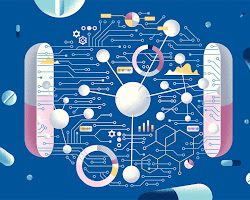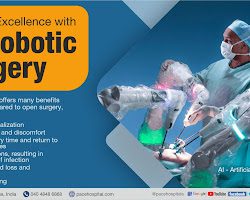Top AI Technologies Revolutionizing Healthcare
AI Technologies, also known as Artificial Intelligence Technologies, refer to a wide range of tools, systems, and methods that enable machines or computer systems to perform tasks that typically require human intelligence. These technologies leverage advanced algorithms, machine learning techniques, and big data processing to simulate human-like cognitive processes such as perception, reasoning, learning, and decision-making.
AI technologies can be categorized into various subfields, each with its own focus and applications. Here are some prominent AI technologies:
1. Machine Learning (ML): Machine learning involves the development of algorithms that enable computers to learn from data and improve their performance without being explicitly programmed. ML algorithms analyze patterns, recognize correlations, and make predictions or decisions based on the data they have processed. Supervised learning, unsupervised learning, and reinforcement learning are common types of machine learning.
2. Deep Learning: Deep learning is a subset of machine learning that utilizes artificial neural networks (ANNs) inspired by the structure and functioning of the human brain. Deep learning models consist of multiple layers of interconnected neurons that can learn complex representations of data. This technology has revolutionized AI by achieving remarkable breakthroughs in tasks like image and speech recognition, natural language processing, and autonomous driving.
3. Natural Language Processing (NLP): NLP focuses on enabling machines to understand, interpret, and generate human language. It involves processing and analyzing large amounts of textual data, enabling applications such as chatbots, virtual assistants, sentiment analysis, machine translation, and text summarization. NLP combines techniques from linguistics, statistics, and machine learning to extract meaning and context from written or spoken language.
4. Computer Vision: Computer vision involves developing algorithms and systems that enable computers to understand and interpret visual information from images or videos. This technology allows machines to perceive, analyze, and interpret the visual world, enabling applications like facial recognition, object detection, image classification, autonomous vehicles, and medical imaging.
5. Robotics and Automation: AI technologies are extensively used in robotics and automation to enable machines to perform physical tasks with varying levels of autonomy. Robotic systems equipped with AI capabilities can perceive and understand the environment, plan and execute actions, and adapt to dynamic situations. Applications range from industrial automation and logistics to healthcare and household robots.
6. Expert Systems: Expert systems are AI technologies that replicate the decision-making capabilities of human experts in specific domains. They utilize knowledge bases and inference engines to analyze input data, apply logical rules, and provide expert-level advice or recommendations. Expert systems find applications in fields such as medicine, finance, law, and engineering, where they assist professionals in complex decision-making processes.
7. Predictive Analytics: Predictive analytics combines AI technologies with statistical modeling techniques to make predictions or forecasts about future events or outcomes. By analyzing historical data patterns, predictive analytics algorithms can identify trends, make predictions, and provide insights for decision-making in areas such as finance, marketing, healthcare, and supply chain management.
8. Autonomous Systems: Autonomous systems integrate various AI technologies to enable machines or systems to operate and make decisions independently, without human intervention. Autonomous vehicles, drones, and smart home devices are examples of autonomous systems that leverage AI to perceive and interact with their surroundings, make decisions in real-time, and adapt to changing conditions.
These are just a few examples of AI technologies, and the field continues to evolve rapidly with new advancements and applications emerging regularly. AI technologies have the potential to transform industries, improve efficiency, drive innovation, and enhance decision-making processes in diverse fields.
Use Cases of AI Technologies
AI technologies have a wide range of applications across various industries and sectors. Here are some prominent use cases where AI is being leveraged to transform processes, improve efficiency, and drive innovation:
1. Healthcare: AI is revolutionizing healthcare by enabling faster and more accurate diagnosis, personalized treatment plans, and improved patient care. AI technologies can analyze medical images, such as X-rays and MRIs, to assist radiologists in detecting abnormalities and diagnosing diseases. AI-powered chatbots and virtual assistants can provide basic medical advice and triage patients. Machine learning algorithms can analyze patient data to identify patterns and predict disease progression, helping doctors make informed decisions.
2. Finance and Banking: AI is transforming the finance industry by automating processes, enhancing risk assessment, and improving customer experiences. AI algorithms can analyze vast amounts of financial data to detect fraud and suspicious activities in real-time, protecting customers and institutions. Chatbots and virtual assistants can provide personalized financial advice and assist customers in managing their accounts. Machine learning models can analyze market trends and predict stock prices, enabling investors to make data-driven decisions.
3. Transportation and Logistics: AI technologies are enhancing transportation and logistics operations by optimizing routes, reducing fuel consumption, and improving supply chain management. AI-powered systems can analyze traffic patterns, weather conditions, and historical data to optimize routes for delivery vehicles, reducing travel time and costs. Autonomous vehicles equipped with AI technologies can navigate roads and highways, improving road safety and reducing the need for human drivers. AI algorithms can also optimize warehouse operations, inventory management, and demand forecasting.
4. Retail and E-commerce: AI is transforming the retail industry by personalizing customer experiences, improving inventory management, and enhancing product recommendations. AI-powered chatbots and virtual assistants can engage with customers, provide product recommendations, and assist in the purchasing process. AI algorithms can analyze customer data to offer personalized promotions and discounts, increasing customer satisfaction and loyalty. Computer vision technologies can enable cashier-less checkout and automate inventory management.
5. Manufacturing and Industrial Automation: AI technologies are revolutionizing manufacturing and industrial automation by optimizing processes, improving quality control, and enabling predictive maintenance. AI-powered robots and cobots (collaborative robots) can perform repetitive tasks with precision, improving productivity and reducing human errors. Machine learning algorithms can analyze sensor data to detect anomalies and predict machine failures, enabling proactive maintenance. AI technologies can also optimize production schedules, inventory management, and supply chain logistics.
6. Customer Service and Support: AI technologies are improving customer service and support by automating routine inquiries, providing instant responses, and enhancing customer experiences. Chatbots and virtual assistants equipped with natural language processing capabilities can understand customer queries and provide relevant information or assistance. AI-powered sentiment analysis can help companies gauge customer satisfaction levels and address concerns proactively. Voice recognition technologies enable voice-activated customer support systems and voice assistants.
7. Energy and Utilities: AI technologies are being employed in the energy and utilities sector to optimize energy distribution, improve grid management, and enhance energy efficiency. AI algorithms can analyze energy consumption patterns and predict demand, enabling utilities to optimize energy generation and distribution. Machine learning models can analyze sensor data from power grids to detect anomalies and predict potential failures, ensuring reliable and efficient energy supply. AI technologies also enable the integration of renewable energy sources into the grid.
8. Education: AI is transforming the education sector by personalizing learning experiences, automating administrative tasks, and improving educational outcomes. AI-powered tutoring systems can adapt to individual student needs, providing personalized instruction and feedback. Natural language processing technologies can analyze student essays and provide automated grading. Intelligent learning platforms can recommend relevant learning resources and adapt curriculum based on student performance data.
Also read: Blockchain Technologies in Modern Online Casinos
Relation of AI Technologies with HealthCare Sector
AI technologies have a profound impact on the healthcare sector, revolutionizing various aspects of patient care, diagnostics, research, and administrative processes. The relationship between AI technologies and healthcare can be seen in the following areas:
1. Medical Imaging and Diagnostics: AI technologies, particularly deep learning algorithms, have made significant advancements in medical imaging analysis. These algorithms can analyze images from various modalities, such as X-rays, CT scans, MRIs, and mammograms, to aid in the detection and diagnosis of diseases. For instance, AI algorithms can identify patterns indicative of tumors, anomalies, or early signs of diseases. This improves the accuracy and efficiency of radiologists, leading to faster and more accurate diagnoses.
2. Disease Diagnosis and Risk Assessment: AI technologies play a crucial role in disease diagnosis and risk assessment. Machine learning algorithms can analyze large amounts of patient data, including electronic health records (EHRs), lab results, genetic information, and lifestyle factors, to identify patterns and predict disease outcomes. This helps physicians make more informed decisions and personalize treatment plans based on a patient’s individual characteristics, improving the accuracy and effectiveness of diagnoses.
3. Drug Discovery and Development: AI technologies accelerate the drug discovery and development process by analyzing vast amounts of biomedical data, scientific literature, and molecular structures. Machine learning models can identify potential drug targets, predict drug efficacy, and assist in optimizing drug design. AI algorithms also enable virtual screening of large chemical libraries to identify potential drug candidates, reducing the time and cost involved in the early stages of drug development.
4. Personalized Medicine: AI technologies enable personalized medicine by analyzing patient data and generating individualized treatment plans. Machine learning algorithms can consider various factors such as genetics, medical history, lifestyle, and treatment responses to predict the most effective treatment options for a specific patient. This approach helps optimize treatment outcomes, minimize side effects, and improve patient satisfaction.
5. Telemedicine and Remote Monitoring: AI technologies enhance telemedicine and remote monitoring capabilities. AI-powered chatbots and virtual assistants can engage with patients, gather initial information, and provide basic medical advice or triage. Remote monitoring devices equipped with AI algorithms can track vital signs, detect anomalies, and alert healthcare providers in real-time. This allows for continuous monitoring of patients’ health status and early detection of potential complications, improving patient outcomes and reducing hospital readmissions.
6. Healthcare Operations and Administration: AI technologies streamline administrative tasks in healthcare organizations, improving efficiency and reducing the administrative burden on healthcare providers. AI-powered systems can automate appointment scheduling, patient registration, and billing processes. Natural language processing algorithms enable efficient processing and analysis of medical records and clinical documentation, reducing the time spent on manual data entry and documentation.
7. Medical Research and Clinical Trials: AI technologies facilitate medical research and clinical trials by analyzing vast amounts of scientific literature, genetic data, and patient records. AI algorithms can identify potential research areas, predict treatment responses, and assist in patient recruitment for clinical trials. This accelerates the discovery of new treatments and interventions, leading to advancements in medical knowledge and improved patient care.
8. Public Health Monitoring and Outbreak Prediction: AI technologies aid in public health monitoring and outbreak prediction. Machine learning models can analyze various data sources, such as social media, news reports, and disease surveillance data, to detect early signs of disease outbreaks and predict their spread. This enables public health authorities to take proactive measures, allocate resources effectively, and implement timely interventions to control the spread of diseases.
The integration of AI technologies into the healthcare sector holds tremendous potential for improving patient outcomes, increasing operational efficiency, and driving medical advancements. However, ethical considerations, data privacy, and regulatory frameworks need to be carefully addressed to ensure the responsible and ethical use of AI in healthcare.
Also read: 5 Ways Blockchain Can Improve Healthcare Industry
Top AI Technologies Revolutionizing HealthCare
Artificial intelligence (AI) is rapidly transforming the healthcare industry, with the potential to improve patient care, reduce costs, and streamline operations. Here are some of the top AI technologies that are revolutionizing healthcare:
**1. ** Machine learning for medical diagnosis. Machine learning algorithms can be trained on large datasets of medical images, text, and other data to identify patterns that would be difficult for humans to spot. This can be used to improve the accuracy of medical diagnoses, especially for complex diseases. For example, Google AI has developed a machine learning algorithm that can detect diabetic retinopathy, a leading cause of blindness, with 90% accuracy.
**2. ** Natural language processing for clinical decision support. Natural language processing (NLP) can be used to analyze patient records, electronic health records (EHRs), and other medical data to identify potential problems and provide clinical decision support. For example, NLP can be used to identify patients who are at risk of developing sepsis or other complications.
**3. ** Robotics for surgery and other procedures. Robots are increasingly being used in healthcare, for tasks such as surgery, drug delivery, and rehabilitation. Robots can be used to perform delicate procedures with greater precision than humans, and they can also be used to access areas of the body that would be difficult or dangerous for humans to reach. For example, the da Vinci Surgical System is a robotic surgical system that is used to perform a wide range of procedures, including prostate cancer surgery and heart valve repair.
**4. ** Virtual reality and augmented reality for patient care. Virtual reality (VR) and augmented reality (AR) are being used in healthcare to provide immersive training experiences for healthcare professionals, to help patients with rehabilitation, and to create more engaging and informative patient education materials. For example, VR can be used to train surgeons on how to perform complex procedures, and AR can be used to help patients with stroke rehabilitation.

**5. ** AI-powered drug discovery. AI is being used to accelerate the drug discovery process by identifying new drug targets, designing new drugs, and predicting the efficacy and safety of drugs. For example, the AI-powered drug discovery platform developed by Insilico Medicine has been used to identify new drug targets for cancer and other diseases. 
These are just a few of the many AI technologies that are revolutionizing healthcare. As AI continues to develop, it is likely to have an even greater impact on the healthcare industry, improving patient care, reducing costs, and streamlining operations.
Also read:Blockchain In Healthcare: Applications and Career Opportunities
Importance of AI Technologies for Healthcare Sector
AI technologies play a crucial and transformative role in the healthcare sector, bringing numerous benefits and advancements to patient care, medical research, and administrative processes. Here are some of the key reasons why AI technologies are important for the healthcare sector:
1. Enhanced Diagnostics and Early Detection: AI-powered medical imaging analysis can assist healthcare professionals in accurately detecting and diagnosing various medical conditions, including cancers, cardiovascular diseases, and neurological disorders. AI algorithms can identify subtle patterns and anomalies in medical images that might be missed by the human eye, leading to earlier and more accurate diagnoses. Early detection is critical for improving treatment outcomes and patient survival rates.
2. Personalized Treatment Plans: AI technologies can analyze vast amounts of patient data, including genetic information, medical history, lifestyle factors, and treatment responses. By considering these individual characteristics, AI can help healthcare providers develop personalized treatment plans tailored to each patient’s unique needs and characteristics. Personalized medicine leads to more effective treatments, reduced side effects, and better patient outcomes.
3. Drug Discovery and Development: The drug discovery process is time-consuming and expensive. AI technologies streamline this process by analyzing complex biological data, identifying potential drug targets, and predicting the efficacy of drug candidates. AI-driven virtual screening of chemical compounds can expedite the identification of potential drug candidates, speeding up the drug development timeline and reducing costs.
4. Remote Monitoring and Telemedicine: AI-powered remote monitoring devices and telemedicine platforms enable continuous monitoring of patients’ health from their homes. These technologies can track vital signs, detect anomalies, and provide real-time alerts to healthcare providers. Remote monitoring and telemedicine enhance patient access to care, reduce hospital readmissions, and support patients with chronic conditions.
5. Improving Healthcare Efficiency: AI technologies automate administrative tasks, such as appointment scheduling, patient registration, and billing processes, which reduces the administrative burden on healthcare providers. Natural language processing (NLP) algorithms facilitate the efficient processing of medical records and clinical documentation, freeing up valuable time for healthcare professionals to focus on patient care.
6. Advancing Medical Research: AI technologies analyze vast amounts of scientific literature, research data, and clinical records, enabling researchers to make new discoveries and identify trends that might otherwise go unnoticed. AI-driven insights can support medical research, leading to advancements in medical knowledge, treatment protocols, and disease management strategies.
7. Public Health Management: AI technologies can help public health officials monitor and predict disease outbreaks by analyzing various data sources, including social media, news reports, and disease surveillance data. Early detection and prediction of outbreaks enable timely intervention and resource allocation, supporting public health management efforts.
8. Improving Patient Engagement and Experience: AI-powered virtual assistants and chatbots can engage with patients, provide timely information, answer frequently asked questions, and offer support. These technologies enhance patient engagement and experience by providing immediate access to relevant healthcare information.
9. Addressing Physician Shortages: AI technologies can assist healthcare professionals by automating repetitive tasks and augmenting decision-making processes. This support can alleviate the burden on healthcare providers, particularly in regions facing physician shortages, and improve overall healthcare accessibility.
10. Enhancing Medical Education: AI technologies can enhance medical education by providing interactive learning platforms, virtual simulations, and personalized tutoring. AI-powered learning systems adapt to individual student needs, providing personalized feedback and support for better learning outcomes.
The importance of AI technologies in the healthcare sector is evident in their potential to revolutionize patient care, medical research, and healthcare operations. As AI continues to advance, it will undoubtedly play an increasingly integral role in shaping the future of healthcare, leading to improved patient outcomes and more efficient healthcare delivery. However, ethical considerations, data privacy, and regulatory guidelines must be carefully navigated to ensure responsible and ethical use of AI in healthcare.
Future of AI and HealthCare
The future of AI and healthcare holds tremendous potential for transformative advancements in patient care, medical research, and healthcare systems. Here are some key areas that showcase the promising future of AI in healthcare:
1. Precision Medicine: AI technologies will continue to drive the advancement of precision medicine, where treatments and interventions are tailored to an individual’s unique characteristics. AI algorithms will analyze vast amounts of patient data, including genomics, proteomics, lifestyle factors, and treatment responses, to develop personalized treatment plans. This approach will enable healthcare providers to deliver targeted therapies with improved efficacy and reduced side effects.
2. Predictive Analytics and Early Intervention: AI algorithms will play a vital role in predictive analytics, enabling early identification of diseases and potential health complications. By analyzing patient data, including electronic health records, lifestyle data, and genetic information, AI can predict disease risks, detect early warning signs, and support preventive interventions. This proactive approach can lead to better health outcomes and improved patient well-being.
3. AI-Assisted Surgery and Robotics: AI technologies will further enhance surgical procedures through robotic systems and AI-assisted interventions. AI algorithms can analyze real-time data from surgical instruments, patient vitals, and imaging, providing surgeons with valuable insights and guidance during complex procedures. This can improve surgical precision, reduce complications, and enhance patient safety.
4. Drug Discovery and Development: AI will revolutionize the drug discovery and development process by accelerating the identification of potential drug candidates, optimizing drug design, and predicting drug efficacy. Machine learning algorithms can analyze vast amounts of biomedical data, scientific literature, and clinical trial results to expedite the discovery of novel treatments and interventions. AI-powered virtual screening and in-silico testing can significantly reduce the time and cost associated with bringing new drugs to market.
5. Remote Patient Monitoring and Telemedicine: AI technologies will continue to advance remote patient monitoring and telemedicine capabilities. Remote monitoring devices equipped with AI algorithms will enable continuous tracking of vital signs, early detection of health changes, and real-time interventions. Telemedicine platforms will leverage AI to improve patient-doctor interactions, provide intelligent triage, and enhance remote diagnostic capabilities, allowing for expanded access to quality healthcare.
6. Intelligent Electronic Health Records (EHRs): AI-powered EHR systems will transform healthcare data management and analysis. Natural language processing (NLP) algorithms will extract valuable insights from unstructured clinical notes and medical records, enabling more efficient data analysis, better decision support, and improved patient outcomes. AI will also enhance data interoperability and facilitate the secure sharing of patient information across healthcare systems.
7. Virtual Assistants and Chatbots: AI-powered virtual assistants and chatbots will become more sophisticated in supporting patients and healthcare providers. These conversational agents will provide personalized health advice, answer medical queries, assist in appointment scheduling, and offer mental health support. Natural language understanding and generation capabilities will improve, creating more natural and contextually aware interactions.
8. Ethical Considerations and Regulatory Frameworks: As AI technologies become more integrated into healthcare, ethical considerations and regulatory frameworks will play a vital role. Guidelines and regulations will need to address issues such as data privacy, security, bias, transparency, and the responsible use of AI in healthcare. Ensuring fairness, accountability, and transparency will be crucial for building trust and maintaining ethical practices in AI-driven healthcare.
It is important to note that while the future of AI in healthcare is promising, there will be challenges to overcome. Integration with existing healthcare systems, data standardization, ethical dilemmas, and the need for specialized AI training for healthcare professionals will be key considerations. However, with continued advancements in AI technologies and collaboration between healthcare professionals, researchers, and technology experts, the future of AI in healthcare holds great potential for improving patient outcomes, advancing medical research, and enhancing healthcare delivery.
https://twitter.com/i/status/1677653286352986113
Stay informed with daily updates from Blockchain Magazine on Google News. Click here to follow us and mark as favorite: [Blockchain Magazine on Google News].
Get Blockchain Insights In Inbox
Stay ahead of the curve with expert analysis and market updates.
latest from tech
Disclaimer: Any post shared by a third-party agency are sponsored and Blockchain Magazine has no views on any such posts. The views and opinions expressed in this post are those of the clients and do not necessarily reflect the official policy or position of Blockchain Magazine. The information provided in this post is for informational purposes only and should not be considered as financial, investment, or professional advice. Blockchain Magazine does not endorse or promote any specific products, services, or companies mentioned in this posts. Readers are encouraged to conduct their own research and consult with a qualified professional before making any financial decisions. The featured image used is just a creative depiction of the title and it does not intend to hurt sentiments of any person or institution. If it hurts anyone sentiments, please do not hesitate to reach out to Blockchain Magazine.

 Bitcoin
Bitcoin  Ethereum
Ethereum  Tether
Tether  XRP
XRP  Solana
Solana  USDC
USDC  Dogecoin
Dogecoin  Cardano
Cardano  Lido Staked Ether
Lido Staked Ether  TRON
TRON  Wrapped Bitcoin
Wrapped Bitcoin  Chainlink
Chainlink  Wrapped stETH
Wrapped stETH  Avalanche
Avalanche  Sui
Sui  Stellar
Stellar  Toncoin
Toncoin  Shiba Inu
Shiba Inu  Hedera
Hedera  LEO Token
LEO Token  Hyperliquid
Hyperliquid  Litecoin
Litecoin  Bitget Token
Bitget Token  WETH
WETH  USDS
USDS  Polkadot
Polkadot  Bitcoin Cash
Bitcoin Cash  Ethena USDe
Ethena USDe  Wrapped eETH
Wrapped eETH  Uniswap
Uniswap  MANTRA
MANTRA  Ondo
Ondo  Monero
Monero  Pepe
Pepe  WhiteBIT Coin
WhiteBIT Coin  Aave
Aave  NEAR Protocol
NEAR Protocol  Mantle
Mantle  Official Trump
Official Trump  Dai
Dai  Aptos
Aptos  Internet Computer
Internet Computer  Ethereum Classic
Ethereum Classic  Bittensor
Bittensor  OKB
OKB  Cronos
Cronos  POL (ex-MATIC)
POL (ex-MATIC)  Gate
Gate 






